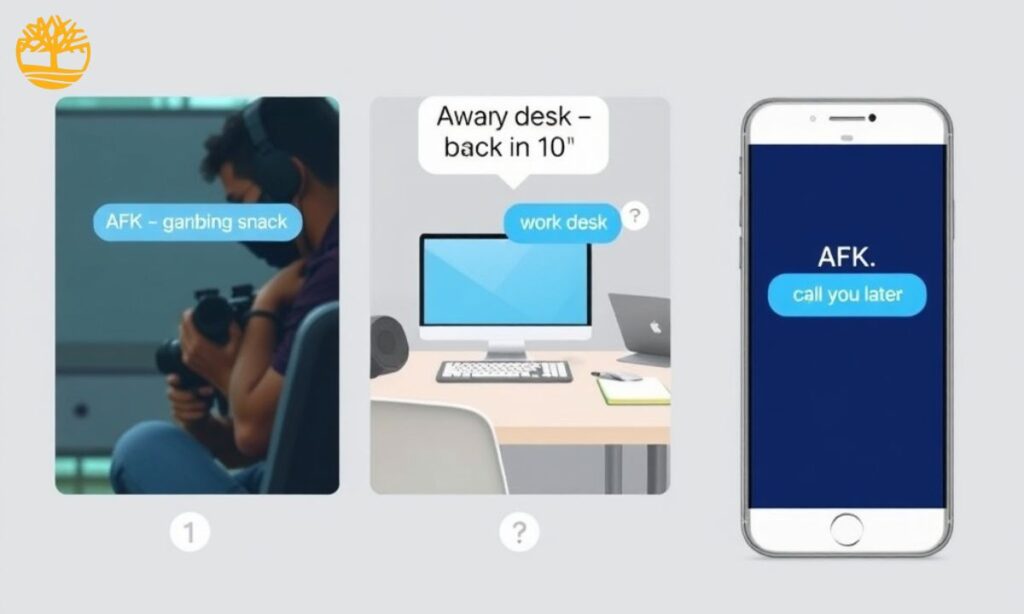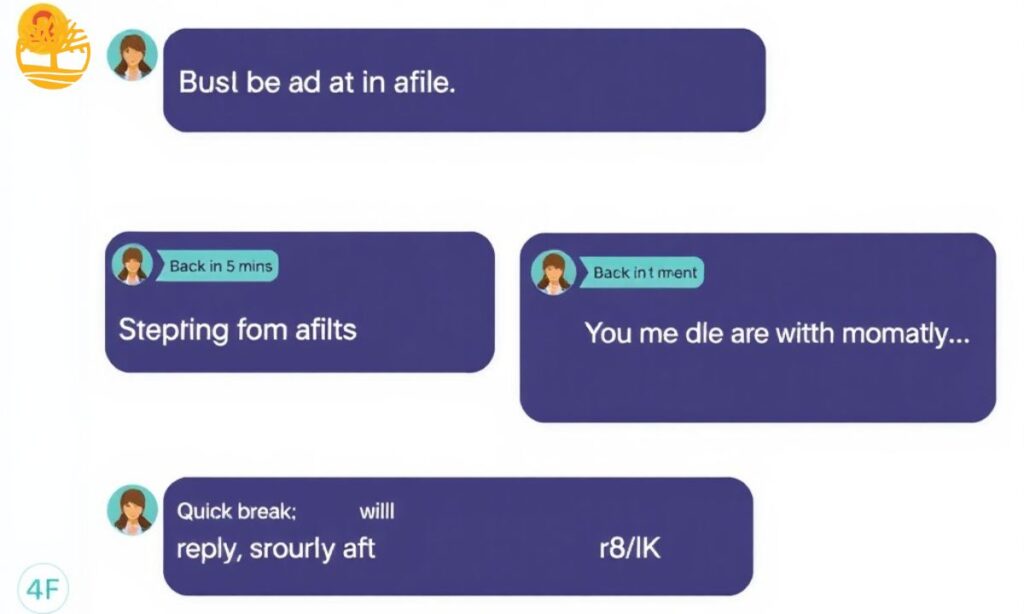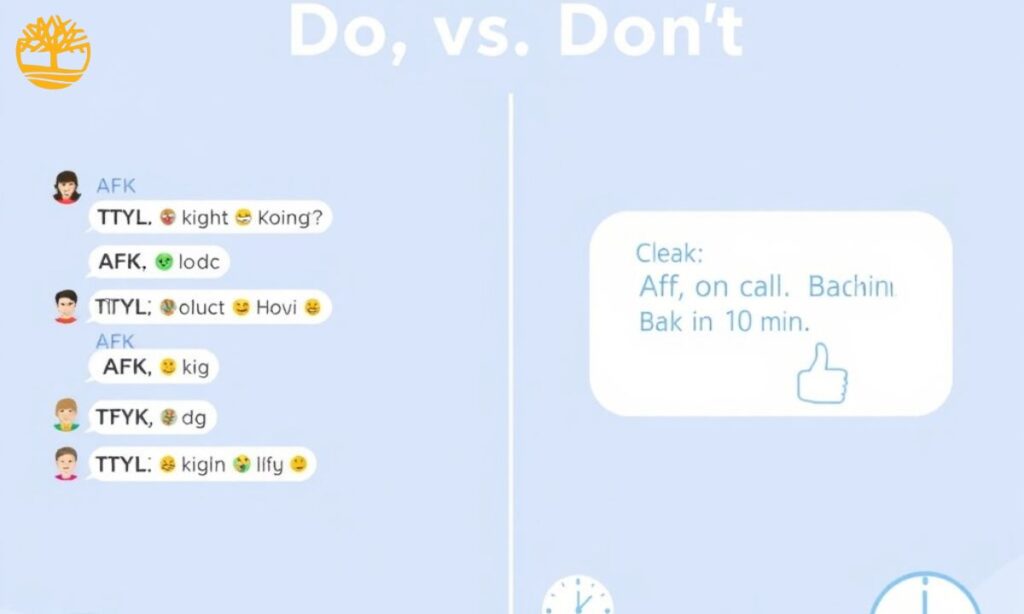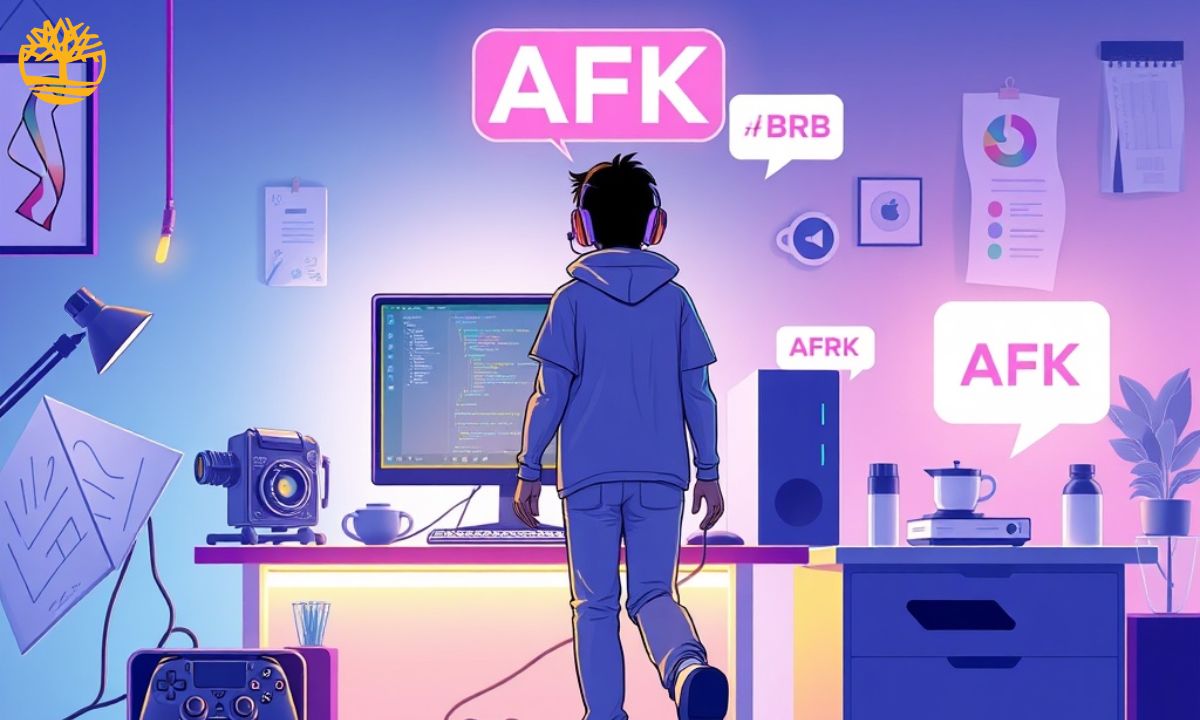Ever seen “AFK” pop up in a chat and wondered what it really means? This simple three-letter acronym carries more weight than it seems. In online spaces, one quick AFK can explain why someone disappears without a word.
The phrase stands for “Away From Keyboard,” but its meaning goes beyond gaming. From texting friends to workplace chats, AFK has become a universal signal of being temporarily unavailable. Let’s break down how it’s used and why it matters.
What Does AFK Mean in Online Communication?

The term AFK is short for “Away From Keyboard.” It is used when someone steps away during an online chat or game. This simple phrase helps others know you are temporarily unavailable. Today, AFK is common in texting, gaming, and even work messages.
Definition of AFK
AFK means you are not at your keyboard, but it does not always mean you are gone completely. People use it to say, “I’ll be back soon” or “I’m busy for a moment.” It helps keep conversations clear without leaving others guessing.
In online spaces, AFK is a signal of courtesy. It tells friends, teammates, or coworkers that you are not ignoring them. Instead, you are simply away. It bridges the gap between real-world actions and online communication.
Origins of AFK in Gaming and Chat Rooms
The phrase AFK first became popular in early online chat rooms and multiplayer games. Gamers used it to explain sudden pauses without leaving teammates confused. Over time, AFK spread beyond gaming into everyday online communication.
In the digital world, AFK is part of internet culture. It reflects how online communities created short codes for common situations. What started as gamer slang is now widely understood across chats, texts, and even workplaces.

How AFK Is Used Across Different Platforms
The term AFK has grown beyond its gaming roots. It is now part of everyday online talk. From competitive matches to casual group chats, AFK signals that someone is temporarily away. Its meaning stays the same, but the use shifts with each platform.
AFK in Online Gaming
In gaming, AFK usually means a player has stepped away during a match. It can affect team performance, especially in fast-paced games. Some platforms even penalize players who go AFK too often. Still, it is a common and accepted part of gaming culture.
Players also use AFK to plan breaks or signal short pauses. It helps teammates understand that someone is not ignoring the game. In multiplayer settings, clear communication like AFK keeps the team coordinated, even when someone is gone.
AFK in Social Media and Chats
On social platforms, AFK is more casual. Friends use it to let others know they will not respond right away. It can mean taking a quick break, stepping out of the room, or even logging off for a while. The tone is usually lighter than in gaming.
In work or group chats, AFK is sometimes used as shorthand for being away from the desk. It’s a quick way to manage expectations without writing a long reply. The phrase shows how digital spaces adapt simple codes for everyday communication.

Polite and Professional Alternatives to AFK
While AFK works well in casual chats, professional settings often call for clearer phrases. Using alternatives helps you sound respectful, direct, and professional. These options avoid confusion and set the right tone. They show both courtesy and awareness of context.
Useful Alternatives
- “Be right back (BRB)” – simple and polite, often used in both casual and semi-formal chats.
- “Stepping away for a moment” – works well in work settings, showing respect for the group.
- “Back in 5 minutes” – specific and professional, especially in team meetings or group chats.
- “Away from desk” – often used in workplaces to let others know you’re briefly unavailable.
- “Unavailable right now, will reply soon” – shows responsibility and consideration for others’ time.
- “On a quick break” – polite, clear, and acceptable in both casual and formal communication.

Choosing the Right AFK Phrase for Your Audience
Not every setting is the same, and neither is how you use AFK. What works with friends may not fit in a work chat. The right phrase shows respect, clarity, and awareness. Matching your words to the audience helps avoid confusion.
Casual vs. Professional Contexts
In casual chats, AFK or BRB are short and easy. They work well with friends or gaming groups. No one expects formality, and quick codes save time. Still, being clear helps keep conversations flowing.
In professional spaces, people expect more detail. A simple “Away from desk” or “Back in 5 minutes” feels more polite. It shows you value others’ time. Using the right phrase keeps your tone professional.
Casual Options:
- AFK
- BRB
- Be back soon
Professional Options:
- Away from desk
- Stepping away for a moment
- Back in 5 minutes
Tips for Mixed Audiences
Sometimes you are chatting with both friends and coworkers. In these cases, choose a phrase that balances clarity and respect. Aim for wording that works in both casual and semi-formal spaces.
One safe option is being specific: “Back in 5” works in nearly every setting. If you’re unsure, go for neutral and polite. Avoid slang that could confuse some people. A balanced approach keeps everyone on the same page.
Good Mixed-Audience Phrases:
- Back in a few minutes
- Stepping away briefly
- Be right back
Examples of AFK in Real-Life Conversations
The phrase AFK appears in everyday digital life. From gaming chats to office messages, it helps explain short absences. These examples show how flexible AFK can be. It’s a quick way to stay clear and polite without long explanations.
AFK in Gaming Chats
In multiplayer games, teammates use AFK to explain sudden silence. A quick “AFK for 2 mins” tells the team not to expect action. It prevents frustration and keeps communication open. For gamers, AFK is part of teamwork.
It also helps avoid penalties in competitive games. Some platforms reduce points if players quit without warning. Writing AFK shows you did not abandon the match on purpose. It’s a sign of respect for teammates.
Example: “AFK, grabbing water. Back in 5.”
AFK in Work and Social Messages
In office chats, AFK works as shorthand for stepping away from the desk. It avoids awkward silence when someone is suddenly gone. Teams often use AFK during breaks, meetings, or quick tasks.
On social media, AFK is casual but useful. It lets friends know you’re not ignoring them. Instead, you’re busy with something offline. The phrase bridges online and real-world presence.
Example: “AFK, quick call with my manager.”
The Role of AFK in Modern Internet Culture
The phrase AFK has become part of internet identity. It started in gaming but spread into everyday digital spaces. Today, AFK reflects how online life blends with real life. It’s a symbol of temporary disconnection in a connected world.
AFK as a Cultural Code
AFK acts like a universal signal across online communities. Whether in forums, group chats, or streaming, people instantly understand it. It reduces confusion and keeps conversations smooth.
Its simplicity is why AFK became a cultural norm. Just three letters express a real-world action. It shows how digital culture values speed, clarity, and shared meaning. AFK is now part of internet language.
Key Points:
- Easy to type and understand
- Common across platforms
- Bridges online and offline actions
- Signals respect for others’ time
- Widely adopted beyond gaming
AFK and Digital Balance
AFK also highlights the need for breaks in digital spaces. It reminds us that even in constant online life, people need pauses. Saying AFK shows honesty about limits and priorities.
This balance is part of healthy internet culture. AFK normalizes stepping away without guilt. It creates space for rest while keeping communication intact. In this way, AFK is more than a code—it’s a reminder of digital well-being.
Best Practices for Using AFK Effectively
Using AFK is simple, but being thoughtful makes it more effective. Clear context ensures others understand your absence. Avoiding overuse keeps your communication professional. These best practices help you stay respectful and clear in digital spaces.

Providing Context for Clarity
AFK works best when paired with a short explanation. Saying “AFK for lunch” is more helpful than just “AFK.” This shows respect for others’ time and avoids confusion. Context makes digital communication smoother.
In team settings, context also reduces frustration. People know how long you’ll be gone and can plan around it. Adding details builds trust and improves teamwork. A simple extra phrase makes AFK far more effective.
Examples of Clear AFK Messages:
- AFK, grabbing coffee (5 min)
- AFK, quick meeting (30 min)
- AFK, school run (back by 3 PM)
Avoiding Overuse of Acronyms
Using AFK too often can feel impersonal. If every message is full of acronyms, meaning gets lost. Balance is key—use acronyms when quickness matters, but don’t let them replace real words.
Overuse may confuse people unfamiliar with internet shorthand. It can also feel abrupt in professional settings. Mix AFK with polite, full phrases for balance. Clear language helps you connect better with your audience.
Acronym Overuse vs. Balanced Use
| Situation | Overuse of AFK | Balanced Approach |
| Work Chat | “AFK, BRB, TTYL” | “AFK, quick call. Back in 10 min.” |
| Gaming Chat | “AFK, IDC, GG” | “AFK, grabbing water. Back soon.” |
| Social Media DM | “AFK lol tty” | “AFK, off to dinner. Catch you later.” |
How Tools Like Trinka Enhance AFK Communication
Modern tools like Trinka make online communication smoother and clearer. They help refine your AFK messages so they sound polite and professional. Instead of sending abrupt acronyms, you can craft context-rich responses. This ensures your absence is understood in the right tone.
Ways Trinka Improves AFK Communication:
- Suggests polite alternatives to AFK phrases
- Adjusts tone for casual or professional settings
- Helps avoid unclear or abrupt language
- Ensures grammar and clarity in short AFK notes
- Makes your messages more audience-friendly
Final Thoughts
The meaning of AFK may be small in letters, but it carries big weight in digital life. From gaming chats to workplace messages, it reminds us that communication is not only about speed but also about clarity. Choosing the right words shows both respect and awareness.
In the end, using AFK thoughtfully is about balance. Be clear, add context, and adjust your tone for your audience. Whether casual or professional, a well-phrased AFK keeps conversations smooth and relationships strong.

Muhammad Shoaib is a seasoned content creator with 10 years of experience specializing in Meaning and Caption blogs. He is the driving force behind ExactWordMeaning.com, where he shares insightful, clear, and engaging explanations of words, phrases, and captions.











